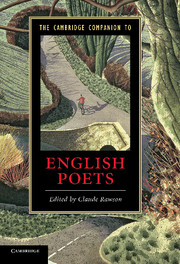Book contents
- Frontmatter
- Introduction
- 1 Geoffrey Chaucer
- 2 Thomas Wyatt
- 3 Edmund Spenser
- 4 William Shakespeare
- 5 John Donne
- 6 Ben Jonson
- 7 George Herbert
- 8 John Milton
- 9 Andrew Marvell
- 10 John Dryden
- 11 Jonathan Swift
- 12 Alexander Pope
- 13 William Blake
- 14 Robert Burns
- 15 William Wordsworth
- 16 Samuel Taylor Coleridge
- 17 George Gordon, Lord Byron
- 18 Percy Bysshe Shelley
- 19 John Keats
- 20 Alfred Lord Tennyson
- 21 Robert Browning
- 22 Emily Brontë
- 23 Christina Rossetti
- 24 Thomas Hardy
- 25 William Butler Yeats
- 26 D. H. Lawrence
- 27 T. S. Eliot
- 28 W. H. Auden
- 29 Philip Larkin
- Further Reading
- Index
Introduction
Published online by Cambridge University Press: 28 May 2011
- Frontmatter
- Introduction
- 1 Geoffrey Chaucer
- 2 Thomas Wyatt
- 3 Edmund Spenser
- 4 William Shakespeare
- 5 John Donne
- 6 Ben Jonson
- 7 George Herbert
- 8 John Milton
- 9 Andrew Marvell
- 10 John Dryden
- 11 Jonathan Swift
- 12 Alexander Pope
- 13 William Blake
- 14 Robert Burns
- 15 William Wordsworth
- 16 Samuel Taylor Coleridge
- 17 George Gordon, Lord Byron
- 18 Percy Bysshe Shelley
- 19 John Keats
- 20 Alfred Lord Tennyson
- 21 Robert Browning
- 22 Emily Brontë
- 23 Christina Rossetti
- 24 Thomas Hardy
- 25 William Butler Yeats
- 26 D. H. Lawrence
- 27 T. S. Eliot
- 28 W. H. Auden
- 29 Philip Larkin
- Further Reading
- Index
Summary
This volume begins with Geoffrey Chaucer, whom Dryden called ‘the Father of English Poetry’. Although there is a distinguished tradition of Old and Middle English poetry, from the eighth-century epic Beowulf to the anonymous chivalric romance of Sir Gawain and the Green Knight in Chaucer’s own time, Chaucer occupies a special place. He had, long before Dryden, been regarded (in the words of the sixteenth-century rhetorician George Puttenham) as holding ‘the first place’ and ‘as the most renowned’ of the earlier English poets. He was one of the first to use the word ‘poete’ in English, applying it to the Italians Dante and Petrarch, as well as to the classical writers Virgil and Lucan. Though he did not use it of himself, or other English writers, he was called poet by others in the sense in which he himself spoke of the great foreign masters as poets. He is, in J. A. Burrow’s description, the first English poet with a distinct personality and a substantial body of work.
Puttenham’s Arte of English Poesie (1589) appeared four years before Shakespeare’s first poem, Venus and Adonis (1593), from the same printer, Richard Field. Like other poets of his time, Shakespeare wrote with a conscious awareness of the forms and devices codified in rhetorical handbooks like Puttenham’s, an example of the interplay between poetic expressiveness and a set of technical prescriptions which is part of the tension between creativity, convention, and constraint in the poetic process. The application of stylistic formulae and ‘rules’, as well as the ‘imitation’ of earlier poets, were seen as strengths in a way not always appreciated in a later intellectual climate, whose standards emphasize the importance of original genius (though Shakespeare is not often denied the possession of that faculty).
- Type
- Chapter
- Information
- The Cambridge Companion to English Poets , pp. 1 - 19Publisher: Cambridge University PressPrint publication year: 2011
- 2
- Cited by

